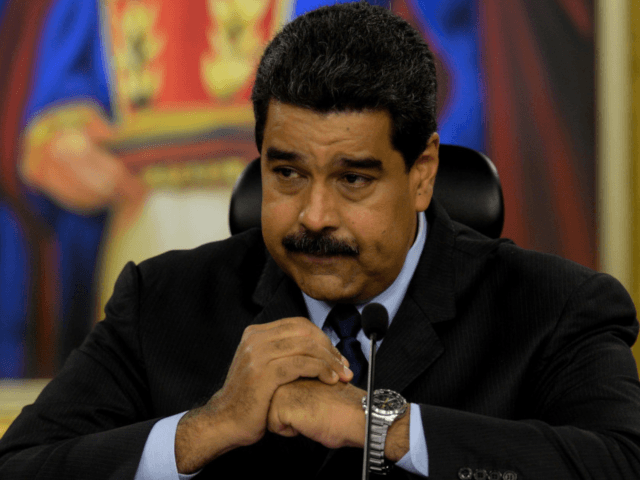The Chinese government officially responded to the attempted uprising against dictator Nicolás Maduro in Venezuela on Monday, issuing a tepid call for “political dialogue” but not issuing a straightforward defense of Maduro, to whom Beijing agreed to lend $5 billion as recently as last September.
Venezuelan President Juan Guaidó – inaugurated in January but still unable to govern as Maduro has refused to leave the presidential palace or give up control of the military – announced last Tuesday that he had finally convinced the nation’s armed forces leaders to abandon Maduro and accept Guaidó as commander in chief. The reality immediately proved slightly more complicated as Maduro resurfaced with his defense minister and top officials by his side and began a violent crackdown on peaceful protesters supporting Guaidó.
At press time, the two men are locked in a stalemate and Maduro is reportedly considering asking Russia to deploy more special forces to the South American country. While Russia has enthusiastically supported Maduro, accusing the United States of “meddling” while setting up sophisticated military infrastructure in the country, China has not similarly embraced the dictator. Russia recently hosted Maduro Foreign Minister Jorge Arreaza to discuss a potential expansion of Russian troop presence in the country and condemn the non-existent U.S. presence there.
Speaking to reporters on Monday, Chinese Foreign Ministry spokesman Geng Shuang said the Communist Party leadership was “highly concerned about the situation in Venezuela.”
“We have all along called for a peaceful settlement through political dialogue and consultation involving all relevant parties in Venezuela under the framework of the country’s constitution and law to avoid violent conflict, restore stability and regain growth momentum at an early date,” he said, adding that “last week’s incident has demonstrated Venezuelan people’s condemnation of violence and aspiration for peace and stability.” Shuang continued:
We hope that the international community will bear in mind the fundamental interests of Venezuela and its people, follow the overriding trend, accelerate efforts to facilitate peace talks, stop provoking political confrontation, abandon military intervention plans and play a constructive role in the political settlement of this issue rather than risk ending up recorded by history as a culprit.
May 1 is Labor Day in China and the government proscribed a four-day holiday to celebrate the glories of communism. Geng’s comments Monday were the first official words from the Chinese government on Guaidó’s uprising, which began on April 30.
Geng did not specify which part of last week’s “incident” – thousands taking to the streets to support Guaidó, the head of Maduro’s secret police (SEBIN) stepping down, Maduro forces killing five people including three teenagers – proved that the Venezuelan people sought peace. As Geng did not mention the United States or Russia, it remained unclear who he believed was at risk for “ending up being recorded by history as a culprit.”
China has traditionally supported Maduro, however, and was a longtime ally of his predecessor, Hugo Chávez. China is also a lukewarm ally of Russia’s and America’s most prominent rival on the geopolitical stage, so Geng’s statement would appear to imply that China opposes U.S. intervention and supports Maduro. Yet the foreign ministry strategically chose not to explicitly say so and mentioned the Venezuelan constitution, under which Guaidó is president and which Maduro is trying to replace.
Chinese state media has been slightly more supportive of Maduro. Xinhua, one of the major news agencies in the country, published an interview with U.N. Special Rapporteur Idriss Jazairy Tuesday accusing the United States of violating human rights with personal sanctions against Maduro and his cronies. The Global Times, a state newspaper, published a straightforward update on the situation Sunday that highlighted Maduro’s remarks on Guaidó’s “failed coup.”
Chinese officials have kept their distance from Maduro since Guaidó’s inauguration in January. At the time, the foreign ministry said it supported “peaceful dialogue” but refused to answer directly when a reporter asked which man China considers the president of Venezuela. At home, the regime of Communist Party leader Xi Jinping used the Venezuelan situation to silence Chinese people who dared comment on the issue, arresting a man for accusing Xi of playing a role in the social and economic destruction of Venezuela by “exporting the evils of communism.”
Perhaps sensing the distance between the two parties, Guaidó urged Chinese and Russian authorities to support his government and protect their investments. Unlike Russia, China already cut most of its investment in Venezuela before this year, cutting Venezuela’s credit off for all of 2017 and warning Chinese businesspeople away from the formerly “hot investment destination.” Maduro finally convinced China to lend him $5 billion in September, but only in exchange for near-total control of the country’s oil industry. A month later, reports revealed that China also sold Venezuela its surveillance technology to establish the “Fatherland Card” system – giving every Venezuelan an identification card without which they could not purchase goods, travel locally, or vote.

COMMENTS
Please let us know if you're having issues with commenting.